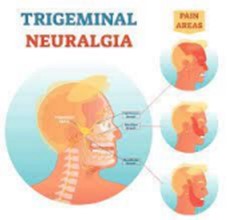The nurse is caring for a client diagnosed with trigeminal neuralgia. The client asks the nurse, "Why do I have so much pain?" Which of the following responses by the nurse is most appropriate?
A "It's a local reaction to nasal stuffiness."
B "It's due to a hypoglycemic effect on the cranial nerve."
C "Release of catecholamines with infection or stress leads to the pain."
D "Pain is due to stimulation of the affected nerve by pressure and temperature.
The Correct Answer is D
Choice A Rationale: Linking the pain to nasal stuffiness is not an accurate explanation of trigeminal neuralgia.
Choice B Rationale: Hypoglycemia is not typically related to trigeminal neuralgia.
Choice C Rationale: Releasing catecholamines with infection or stress is not the primary cause of trigeminal neuralgia.
Choice D Rationale: Pain is often due to stimulation of the affected nerve by pressure and temperature. This is a more accurate and relevant explanation for trigeminal neuralgia.

Nursing Test Bank
Naxlex Comprehensive Predictor Exams
Related Questions
Correct Answer is B
Explanation
Choice A Rationale: Keeping the client NPO until fitted for a halo vest is not a standard practice, and nutritional support should be initiated as soon as possible.
Choice B Rationale: A high-calorie, high-protein diet is typically started within 3 days of a spinal cord injury to support healing and prevent muscle wasting.
Choice C Rationale: High fiber and decreased protein are not the immediate dietary needs after a spinal cord injury. High protein intake is important for tissue repair.
Choice D Rationale: Low fiber and no protein would not be recommended 2 days after a spinal cord injury, as protein intake is crucial for healing and recovery.
Correct Answer is C
Explanation
Choice A Rationale: Notifying the nurse administrator should not be the first action when a client is experiencing pain or injury.
Choice B Rationale: Cleaning up the spill is important to prevent further accidents but does not address the client's immediate pain and discomfort.
Choice C Rationale: Asking the client to remain still is the best first action to ensure the client's safety and assess the extent of the injury or pain.
Choice D Rationale: Documenting the incident is important but should follow
Whether you are a student looking to ace your exams or a practicing nurse seeking to enhance your expertise , our nursing education contents will empower you with the confidence and competence to make a difference in the lives of patients and become a respected leader in the healthcare field.
Visit Naxlex, invest in your future and unlock endless possibilities with our unparalleled nursing education contents today
Report Wrong Answer on the Current Question
Do you disagree with the answer? If yes, what is your expected answer? Explain.
Kindly be descriptive with the issue you are facing.
